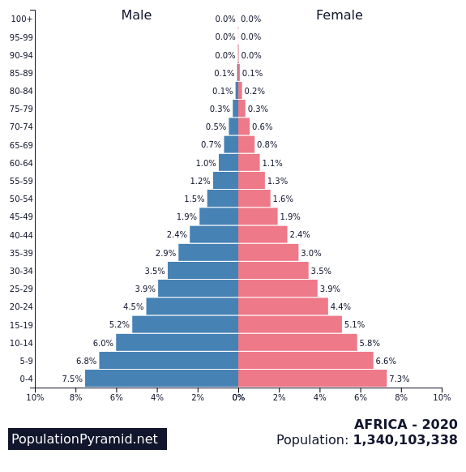Africa is getting younger and more urban
The demographic evolution of Africa is inducing urban problems and creating a market for the development of digital technology. There is a potential demographic boom to be captured across the continent from an anticipated ‘Youth Bulge’, which describes the notion that the proportion of young people in society will continue to grow dramatically over the coming years. The result is that some countries can expect a greater proportion of the population will be of working age.
Additionally, young people are also more comfortable in certain digital contexts, like social networks. They tend to be better connected, better educated, and demand more than previous generations in terms of immediate changes from their government. Young people also use technology in their daily lives more readily, which makes them seemingly more amenable to media that engages citizens digitally. The potential to engage young citizens in online participatory projects is quite high, and provides encouragement to smart city solutions that look to encourage communication between the territory and their local authority. However the pitfalls remain the same as for traditional participation – the use of the digital tool in no way guarantees the participation of young people and engagement or outreach activities will be as important as ever.

The proportion of young adults in African populations will rise, as high birthrates and decreasing infant mortality come to fruition24
With such significant urbanisation and growth of the youth demographic, there will be major urban planning challenges between now and 2050 for the network’s cities. Where will newcomers settle, and what will thoe burgeoning neighbourhoods need? What are the urban planning challenges posed by this growth and how can digital technology respond to them? Whilst urban planning is outside the scope of ASToN, the demographic shifts and pressures are not, and the role of local authorities to integrate newcomers and improve quality of life remains central.
“By 2030, Africa will host 6 of the world’s 41 megacities.”
An increasingly young population, coupled with the lowering cost of mobile data, shows potential for the digital inclusion of more of Africa’s citizens. But digital inclusion also raises questions about data usage in these contexts. Users may be interacting and controlling their personal data for the first time, and mobile users may also exhibit different norms and behaviors surrounding mobile applications. African cities need to anticipate these trends, in order to put themselves in the best position to capitalise on its potential and negotiate risk.
The challenge for Africa as a continent in a shift towards digital is therefore how to captialise on its young, urbanising populations. Providing a wonderful home for future citizens requires the tools and enabling conditions for Africans to be able to participate in the economy of the digital and ecological revolution.
24. Population Pyramid.net. Retrieved from:https://www.populationpyramid.net/africa/2050/


